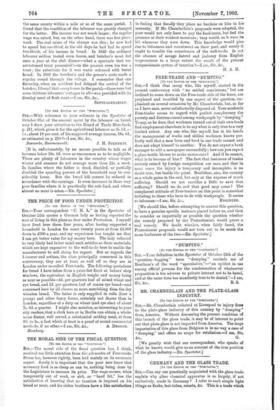FREE-TRADE AND "DUMPING."
[TO THE EDITOR OF TILE "SPECTATOR."]
Sin,—I think that many who, like myself, started in the present controversy with "no settled convictions," but are inclined to come down on the Free-trade side of the fence, are perplexed and troubled by one aspect of the question, em- phasised on several occasions by Mr. Chamberlain, but, so far as I have seen, never satisfactorily disposed of. Your academic Free-trader seems to regard with perfect complacency the poverty and distress caused among workpeople by "damping." To say, as he does, that workmen turned out of their own trade find employment elsewhere is to say what is only true to a very limited extent. Any one who, like myself, has in his hands the management of works and skilled workmen knows per- fectly well that a man born and bred in one trade cannot and does not adapt himself to another. You do not expect a bank manager to edit a newspaper successfully; how can you expect a glass-bottle blower to make motor-cars P And if he cannot, what is to become of him ? The fact that instances of trades entirely ruined by foreign competition are rare, and that in most cases the injury is temporary and incomplete, is no doubt true, but beside the point. Doubtless, also, the country as a whole gains in the end, but only at the expense of much suffering. Should we not sacrifice a little to save that suffering? Should we do evil that good may come ? The complacent attitude of Free-traders on this point is somewhat irritating to those who have to do with workpeople. It seems [We should like, before attempting to answer this question, to have a genuine specific instance placed before us, and then to consider as impartially as possible the question whether the remedy proposed by the Protectionists would prove a real remedy. We doubt whether, when fairly faced, the Protectionist proposals would not turn out to be much the more barbarous of the two.—En. Spectator.]






























































 Previous page
Previous page